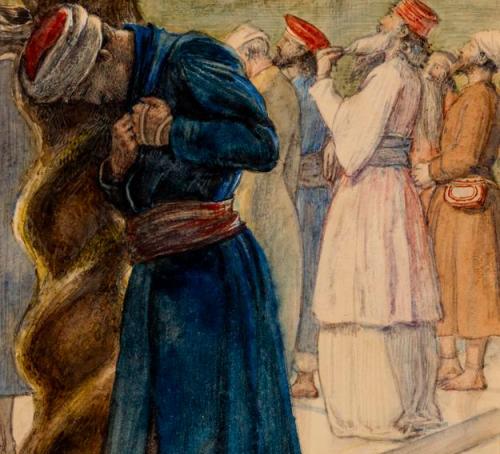This post reflects on how the therapeutic often overshadows or replaces orthodox Christian spirituality in everyday existence and ecclesial life. If and when that happens, we should seek to ask and answer what difference it will make for evaluating the human condition and human worth in our therapeutic age. I will argue that accounting for human depravity and individual responsibility involving lament leads to a deeper and more enriching form of happiness and celebration of human dignity in the long run.
Isolation and Depression without Lament
Before starting, I wish to make a confession. I often feel alone and depressed in public Christian worship that features only celebration and makes no space for lament. This sense of isolation and depression has only been amplified or compounded following our family tragedy involving my adult son’s traumatic brain injury nearly four years ago. Only when there is a place for lament in worship can one find the strength to be resilient and overcome the trauma that leads to a richer form of celebration. Similarly, only when we take seriously our human fragility and depraved condition can we take the first steps toward transcending our fallen state so that someday we can experience a transformed dimension of human flourishing. Only then can we truly celebrate.
Lament, Lent, and Happiness
Perhaps one could trace this lack of attention to lament to a widespread therapeutic emphasis involving happiness in many Christian circles today. All too often, I find talk of happiness reflecting more or less the ‘moralistic therapeutic deistic’ trajectory documented in Christian Smith’s and Melina Lundquist Denton’s Soul Searching. Certainly, everyone desires happiness, as Augustine wrote in the Confessions and Of the Morals of the Catholic Church, but how often do we who are Christians look to find our true happiness in communion with God revealed in Jesus Christ?
Current accounts of happiness often discount consideration of human depravity and the need for repentance and conversion. Rarely does one find mention of lament over personal, moral culpability and observance of Lent in the Christian calendar. Lament and Lent can appear all so depressing to many people. They may mistakenly write it off as some kind of Catholic or Lutheran neurosis. In its place, we find the rather limited power of short-sighted positive thinking.
Human Depravity, Pathology, and the Ambiguity of Human Dignity
Charles Taylor speaks at length on the tensions and conflict involving the therapeutic and spiritual in our secular age. At one point he writes, “casting off religions was meant to free us, give us our full dignity of agents; throwing off the tutelage of religion, hence of the church, hence of the clergy. But now we are forced to go to new experts, therapists, doctors, who exercise the kind of control that is appropriate over blind and compulsive mechanisms; who may even be administering drugs to us. Our sick selves are even more being talked down to, just treated as things, than were the faithful of yore in churches.” (A Secular Age, 620)
One may think that the therapeutic turn involving the removal of talk of sin and depravity elevates human dignity and advances human flourishing. But as the quote from Taylor cautions, we should pause and think again. Taylor offers the following assessment: “…, the therapeutic turn, the move from a hermeneutic of sin, evil, or spiritual misdirection, to one of sickness, has at best ambiguous results for human dignity. And it also has important consequences for our self-understanding. I mentioned above what were formerly seen as the fruits of spiritual misdirection: anguish, spleen, melancholy, emptiness, and [so] on, continue in our therapeutic age. But now they are often read, not as signs of such misdirection, or of your lack of contact with spiritual reality, but simply as pathologies.” (620)
Taylor does not discount the therapeutic. Spirituality and ethics make space for and require consideration of pathologies. “The issue is whether one can speak of pathology alone, or whether there is also a spiritual or ethical hermeneutic to be made.” (622) Spirituality entails ethics at every turn, just as they can and should account for pathologies.
In Pursuit of Holistic Spirituality
Let’s consider how Scripture involves ethical deliberations at every turn in engaging spirituality. The people’s question to Peter, “What shall we do?” (Acts 2:37) and the Philippian jailer’s question to Paul and Silas, “What must I do to be saved?” (Acts 16:30) are as ethical as they are spiritual questions. Repentance, faith, and baptism involving identification with Jesus led to fullness of life. Rather than being filled with remorse, the Philippian jailer who was earlier found trembling in fear was now filled with joy in having come to believe in God (34; cf. 29). Moreover, Jesus tells the parable of the Pharisee and the publican. Only the publican or tax collector went home justified, having cried out humbly and repentantly to God for mercy on account of his sinful state. (Luke 18:9-14)
Spiritual and ethical considerations might have a constructive bearing on analyzing human health and addressing pathologies. Spirituality can make a positive contribution to health care just as medicine can contribute to healthier forms of spirituality. Ethical considerations involving good reasons for action in pursuit of human flourishing must account for both domains.
Accounting for the Full Range of Human Experience, Divine Intervention, and Accountability
How far will celebration and positivity take us if they do not account for the full range of human experience involving depravity and tragedy? What kind of happiness will we attain? Will we miss out on human flourishing par excellence? Medications may play their part in helping us attain homeostasis physically and mentally. But is normalcy and homeostasis as good as it gets?
I will certainly take the normal over the abnormal every day of the week. But for Christianity and other faith traditions, transformation is the goal, or what William James calls “twice born.” And one cannot be twice born, if one has not first died to oneself and one’s abnormal moral inclinations and propensities. As Taylor reasons, if we consider our foibles merely as “the result of sickness, owing to avoidable traumas, faulty upbringing, lack of the right kind of support, and the like, we will expect a lot more people to attain to ‘normalcy’,…But for spiritual outlooks of the transformation perspective, Christianity and Buddhism, say, the point where we achieve our full human capacity, beyond pathological and other confusions about our spiritual condition, is placed well beyond the level of recognized human flourishing.” (623)
This “beyond” is not easily reached, and certainly not without divine intervention in the case of the Christian faith. Moreover, it can never be reached without accountability with other penitent sinners on the path. Any good program to recovery, no matter how many steps, requires corporate transparency and accountability.
Undermining or Mining Personal Responsibility and Dignity
Those who reduce our problems to nothing more than social conditioning may appear to present a more noble view of humanity. But when we fail to account for our own individual responsibility and agency, and easily resort to medicating the pain or feeling of guilt, we actually undermine our worth and dignity. Moreover, we will likely fail to realize how prone we are to sin even more so in groups than merely as individuals, a point Reinhold Niebuhr powerfully made in Moral Man and Immoral Society.
Humanism at its Best
On a less philosophical but lively and literary level, author John Steinbeck weighs in and offers his perspective. Steinbeck reflected a profound humane instinct in his writing. He was wary of “dogmatic ideology,” but was nonetheless quite spiritual and showed appreciation for church life. On those occasions when he went to church, he engaged enthusiastically (Refer here). We see these various themes at work in one account in the book, Travels with Charley, where Steinbeck recounts his trip across America (with his poodle named Charley).
Early on in their journey, Steinbeck stops one Sunday morning in Vermont to hear a fire and brimstone preacher talk about heaven and hell and that we are all responsible agents who must give an account to the Almighty for our actions. Here are a few lines:
The service did my heart and I hope my soul some good. It had been a long time since I had heard such an approach. It is our practice now, at least in the large cities, to find from our psychiatric priesthood that our sins aren’t really sins at all but accidents that are set in motion by forces beyond our control…He put my sins in a new perspective. Whereas they had been small and mean and nasty and best forgotten, this minister gave them some size and bloom and dignity. I hadn’t been thinking very well of myself for some years, but if my sins had this dimension there was some pride left. I wasn’t a naughty child but a first-rate sinner, and I was going to catch it.
Beyond the Morose: Sin and Depravity, Bloom and Dignity
One finds nothing of morose thoughts in Steinbeck’s account of sin and depravity. He realizes, like Taylor, that accounting and reckoning with our own culpability and highlighting the import of individual human responsibility and agency point rather paradoxically to our greatness. If his personal sins had “some size and bloom and dignity,” what would that suggest for his humanity as a whole? Steinbeck may have been wary of dogmatic ideology, but his reflections reflect profound, sound theological instincts that bear on everyday life.
Lament and Confession: First Steps Toward Recovery and Fullness
It is only as we account for the entirety of our human condition, including human depravity, that we can properly assess how to flourish and experience ultimate happiness. Such consideration entails accounting not simply for societal structures that condition us, but also individual responsibility, as Steinbeck’s statement highlights. Such proper acknowledgment involves lament and confession for sins we have committed and right actions we have omitted. Only as we can diagnose a problem, medical or spiritual, can we then move to prescribe the appropriate response in the effort to attain healing. Lament of human tragedy and confession of our fallen, depraved human condition are first steps toward recovery and fullness. It plays an indispensable part in transcending our current status so that someday we can experience a transformed state of human flourishing.














